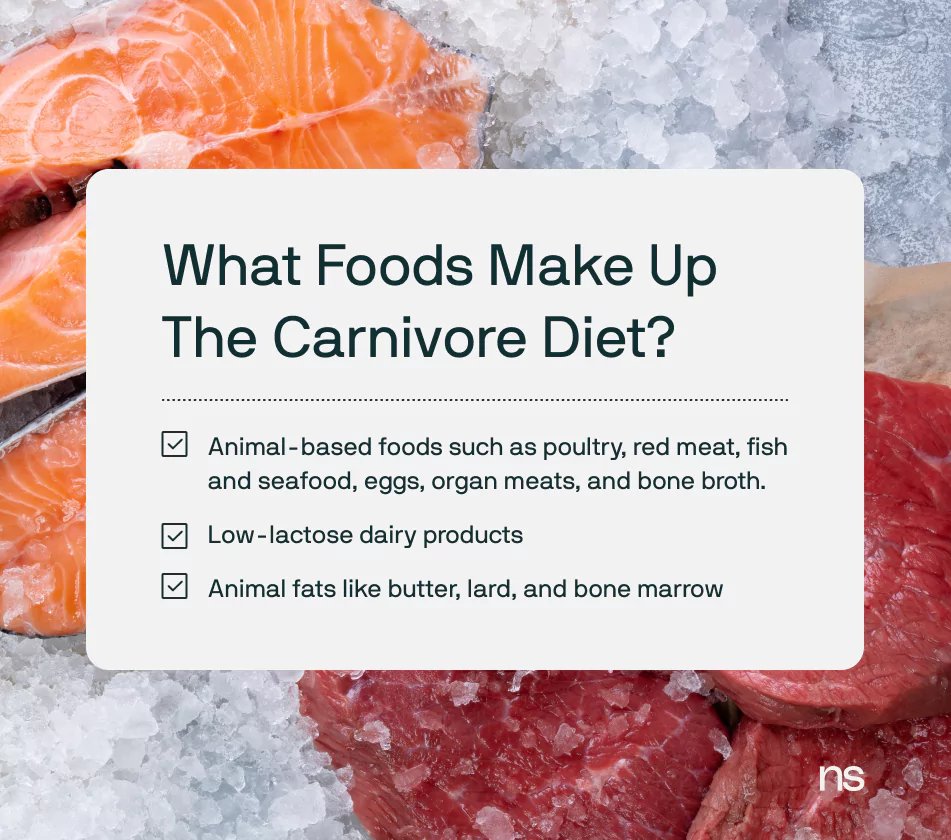What is the Carnivore Diet?

Key Takeaways
The carnivore diet is a relatively new diet created from the controversial theory that ancestral humans ate mostly animal foods such as meat and fish.
The carnivore diet is an extreme form of the ketogenic diet, in which many low-carb foods come from animal sources. However, on the carnivore diet meal plan, all plant-based foods are eliminated, even low-carb ones.
So can the carnivore diet be healthy? What benefits can it potentially have? And what’s the science behind it? To find out the answers to these questions and more, keep reading!
The Carnivore Diet: A Closer Look

Similarly to the keto diet, this diet promotes the following types of foods:
- Any animal-based foods, including poultry, red meat, fish and seafood, eggs, organ meats, and bone broth
- Low-lactose dairy products
- Animal fats like butter, lard, and bone marrow
- Salt, pepper, and other zero carb seasonings
- Coffee and tea—even though these are technically plant-based, some people following the carnivore diet opt keep these in their diet
Foods Not Allowed on the Carnivore Diet
Food groups that the carnivore diet eliminates include:
- Whole grains
- Vegetables
- Fruits
- Beans and legumes
- Added sugar
- Plant-based oils
- Alcohol
- Higher lactose dairy products
What Are the Benefits of the Carnivore Diet?
Proponents of the carnivore diet make claims that it can benefit:
- Weight loss
- Autoimmune symptoms
- Mood disorders
- Blood sugar regulation
- Reduction of many chronic diseases
The diet may also lead to short-term improvements in other symptoms. Here are some possible reasons why:
- The carnivore diet may incidentally boost protein intake. A high-protein diet generally has many health benefits, especially if an individual was under-consuming protein prior to starting the diet.
- It may reduce foods that are common food allergies or sensitivities, such as gluten and soybeans.
- It removes or reduces alcohol consumption, which may help some people feel better if alcohol is aggravating conditions such as endocrine issues or other metabolic health issues.
- It reduces consumption of added sugar and processed or refined carbs, which in higher amounts have been associated with many health concerns.
- It reduces problematic high intakes of certain PUFAs, or polyunsaturated fatty acids, like omega-6s.
- Some people may even have sensitivities or allergies to certain bioactive compounds in plants and may feel better eliminating or minimizing them in the diet. However, research on the prevalence of this issue is ongoing.
- As it is a low-carb diet, the carnivore diet might be beneficial for those struggling with type 2 diabetes or insulin resistance.
It’s important to note that none of the above are unique traits of the carnivore diet, and any potential benefit to be gained from those targeted areas may be done so without necessarily adhering to strict carnivore diet principles.
Why is the Carnivore Diet Controversial?

Some practitioners may claim to feel better on the carnivore diet, despite the lack of science supporting it. A possible explanation for this may be that the carnivore diet inadvertently eliminates certain foods that might be connected to worsened health outcomes.
However, there is extremely limited research on the benefits of the carnivore diet. None of these claims have been thoroughly evaluated or substantiated by the research.
One of the most popular proponents of the carnivore diet is Shawn Baker, a former US orthopedic surgeon, who claims that the diet can treat depression, anxiety, arthritis, obesity, diabetes, and more. Baker’s medical license was revoked in 2017 by the New Mexico Medical Board due to concerns about his competency.
A study that reported exceptional benefits and low incidence adverse effects of the carnivore diet was heavily influenced by Baker. He contributed input in developing the survey instruments, online distribution of the survey, and critical review of the manuscript.
Others, like Paul Saladino of Carnivore MD, have gained notoriety for their promotion of the carnivore diet even though there may still be insufficient evidence to support some of his claims.
Saladino himself has even drifted away from a strict carnivore approach in recent years, and advocated for inclusion of more plants, particularly fruits.
How Did Our Ancestors Actually Eat?
As mentioned earlier, proponents of the carnivore diet claim that ancestral humans ate mostly meat and fish, and that diets deviating from this are the cause of high rates of chronic illness.
However, some research suggests that ancient human hunter-gatherers got only about 30 percent of their annual calories from animal sources. The exception is groups like the Inuit and other groups in the Arctic.
These groups traditionally got as much as 99 percent of their calories from seals, narwhals, and fish. This is because their extremely cold environment was not habitable to most plant foods for most of the year.
The truth is that ancient humans likely also relied on plant foods, including vegetables, grains, and nuts, to meet their caloric needs. The carnivore diet’s focus on meat does not necessarily replicate the diversity of foods that our ancient human ancestors ate.
Weight Loss on the Carnivore Diet

Elements of the carnivore diet may overlap with other types of dietary approaches that may support weight loss. However, these effects may not be attributable to the carnivore diet itself.
Increased protein intake, which can be accomplished outside of the carnivore diet, has been associated with weight loss. Here’s what a few studies show when it comes to protein intake and weight management.
- Increasing protein intake may lead to more sustained weight loss than diets that are lower in protein.
- A modest increase in protein content and a modest reduction in the glycemic index led to an improvement in the maintenance of weight loss.
- A low-carbohydrate diet was more effective for weight loss and cardiovascular risk factor reduction than the low-fat diet. Though research on this is still controversial when looking at long-term outcomes.
Restricting carbohydrates may be an option for some people seeking to lose weight and reduce cardiovascular risk factors. However, you may not need to completely eliminate carbs to lose weight.
Rather, reducing your overall calorie intake, which may be easier to do with a higher intake of satisfying protein, is the main driver of weight loss.
{{rich-text-cta-wl2="/style-guide"}}
Risks of the Carnivore Diet
There are some health concerns and potential side effects that might occur on the carnivore diet.
1) Excessive Sodium and Processed Meat Intake

Some proponents of the carnivore diet emphasize the need for a higher salt intake, because an extremely low-carb diet can increase the need for electrolytes like sodium. However, excessive sodium intake has been linked to an increased risk of high blood pressure, kidney disease, and other negative health outcomes for those who are salt-sensitive.
A high intake of processed meat has also been linked to higher rates of certain types of cancer, including colon, gastric, and rectal cancer. Processed meats don’t necessarily have to be included in the carnivore diet, but they are not explicitly eliminated and some followers may end up relying more on them.
2) Nutrient Deficiencies
Exclusively eating meat and animal products may result in some nutrient imbalances for some people. Nutrient imbalances themselves have been linked to increased risk for obesity. These may also be linked to a higher risk of health conditions like cancer, cardiovascular disease, and osteoporosis.
People following a carnivore diet may be more likely to experience deficiencies in fiber and vitamins C, K1, E, folate, and magnesium. These are micronutrients found in highest abundance in plants.
Some animal products, like egg yolks and seafood, do contain vitamin E. Folate can also be found in egg yolks and liver.
However, consuming large amounts of certain foods like liver in order to meet nutrient needs on a carnivore diet may inadvertently increase other nutrients. These may include copper and vitamin A, which are both very high in foods like liver.
These sorts of imbalances may lead to other health concerns.
3) Exclusion of Plant Foods

The exclusion of plant foods may itself also have a negative effect on health for some people. Diets that are rich in plant-based foods have been associated with a lower risk of certain chronic conditions like heart disease, certain cancers, metabolic syndrome, Alzheimer’s, and type 2 diabetes.
Phytonutrients from plants may have many health benefits, including antioxidant, anti-inflammatory, antiallergic, antispasmodic, anticancer, antiaging, and neuroprotective effects.
4) Poor Digestion
Poor digestion of certain foods, including high-fat foods or large quantities of meat, may negatively impact digestion for some people. These diets may also lead to higher LDL cholesterol levels, which some researchers have argued is linked to higher risk of heart disease.
However, newer research has called into question the strength of the link between cholesterol and heart disease and that discussion may take longer to unpack!
Should You Try The Carnivore Diet?

There is no ideal, one-size-fits-all diet that works for everyone. When it comes to the carnivore diet, this dietary approach is likely unnecessarily restrictive for most people. There is also very little research behind its efficacy and potential long-term effects.
Those who need to limit their protein intake, including people with chronic kidney disease, may need to be cautious about the carnivore diet. Those who struggle with disordered eating or who feel anxiety around food restrictions may also want to avoid this kind of dietary approach.
Dietary customization is best guided by your doctor or a registered dietitian. Working with a trained nutrition or healthcare professional may also help you discover a diet that is right for you and your specific needs.
Find the right Nutrisense programto turn insight into progress.
Go Beyond Glucose Data with Nutrisense
Your glucose can significantly impact how your body feels and functions. That’s why stable levels are an important factor in supporting overall wellbeing. But viewing glucose isn't enough. Nutrisense, you’ll be able to learn how to use your body's data to make informed lifestyle choices that support healthy living.
One-to-one coaching
Sign up to access insurance-covered video calls to work with a glucose expert: a personal registered dietitian or certified nutritionist who will help tailor your lifestyle and diet to your goals.
Monitor and measure what matters
With the Nutrisense CGM Program, you can monitor your glucose with health tech like glucose biosensors and continuous glucose monitor (CGM)s, and analyze the trends over time with the Nutrisense App. This will help you make the most informed choices about the foods you consume and their impact on your health.
Find your best fit
Ready to take the first step? Start with our quiz to find the right Nutrisense program to help you take control.

Heather is a Registered and Licensed Dietitian Nutritionist (RDN, LDN), subject matter expert, and technical writer, with a master's degree in nutrition science from Bastyr University. She has a specialty in neuroendocrinology and has been working in the field of nutrition—including nutrition research, education, medical writing, and clinical integrative and functional nutrition—for over 15 years.




